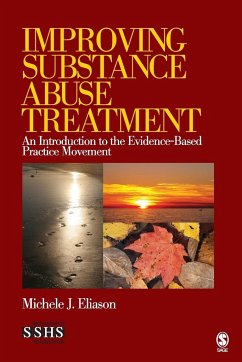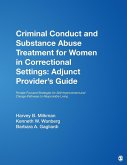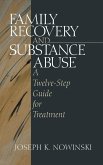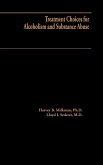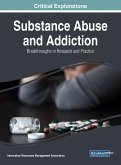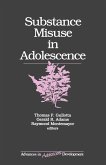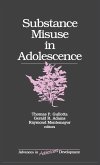Michele J. Eliason
Improving Substance Abuse Treatment
An Introduction to the Evidence-Based Practice Movement
Michele J. Eliason
Improving Substance Abuse Treatment
An Introduction to the Evidence-Based Practice Movement
- Broschiertes Buch
- Merkliste
- Auf die Merkliste
- Bewerten Bewerten
- Teilen
- Produkt teilen
- Produkterinnerung
- Produkterinnerung
This book is an attempt to bridge the gap between research on substance abuse treatment programs and what actually goes on in the field of substance abuse treatment. It is aimed at both the academic and practitioner market (as is Perkinson) and it clearly describes how to determine what evidence based practice is and it addresses some of the challenges that practioners and agency directors might face in implementing EBP. The book is well-written and highly practical. It contains two complete case studies that outline two examples of Evidence based practice which will be particularly useful in the course market.…mehr
Andere Kunden interessierten sich auch für
![Criminal Conduct and Substance Abuse Treatment for Women in Correctional Settings Criminal Conduct and Substance Abuse Treatment for Women in Correctional Settings]() Harvey B. MilkmanCriminal Conduct and Substance Abuse Treatment for Women in Correctional Settings60,99 €
Harvey B. MilkmanCriminal Conduct and Substance Abuse Treatment for Women in Correctional Settings60,99 €![Family Recovery and Substance Abuse Family Recovery and Substance Abuse]() Joseph NowinskiFamily Recovery and Substance Abuse191,99 €
Joseph NowinskiFamily Recovery and Substance Abuse191,99 €![Substance Use and Abuse Substance Use and Abuse]() Russil DurrantSubstance Use and Abuse157,99 €
Russil DurrantSubstance Use and Abuse157,99 €![Treatment Choices for Alcoholism and Substance Abuse Treatment Choices for Alcoholism and Substance Abuse]() Treatment Choices for Alcoholism and Substance Abuse154,99 €
Treatment Choices for Alcoholism and Substance Abuse154,99 €![Substance Abuse and Addiction Substance Abuse and Addiction]() Substance Abuse and Addiction418,99 €
Substance Abuse and Addiction418,99 €![Substance Misuse in Adolescence Substance Misuse in Adolescence]() Thomas P. GullottaSubstance Misuse in Adolescence84,99 €
Thomas P. GullottaSubstance Misuse in Adolescence84,99 €![Substance Misuse in Adolescence Substance Misuse in Adolescence]() Thomas P. GullottaSubstance Misuse in Adolescence132,99 €
Thomas P. GullottaSubstance Misuse in Adolescence132,99 €-
-
-
This book is an attempt to bridge the gap between research on substance abuse treatment programs and what actually goes on in the field of substance abuse treatment. It is aimed at both the academic and practitioner market (as is Perkinson) and it clearly describes how to determine what evidence based practice is and it addresses some of the challenges that practioners and agency directors might face in implementing EBP. The book is well-written and highly practical. It contains two complete case studies that outline two examples of Evidence based practice which will be particularly useful in the course market.
Hinweis: Dieser Artikel kann nur an eine deutsche Lieferadresse ausgeliefert werden.
Hinweis: Dieser Artikel kann nur an eine deutsche Lieferadresse ausgeliefert werden.
Produktdetails
- Produktdetails
- Verlag: Sage Publications, Inc
- Seitenzahl: 202
- Erscheinungstermin: 1. Mai 2007
- Englisch
- Abmessung: 229mm x 152mm x 11mm
- Gewicht: 301g
- ISBN-13: 9781412951319
- ISBN-10: 1412951313
- Artikelnr.: 22534047
- Verlag: Sage Publications, Inc
- Seitenzahl: 202
- Erscheinungstermin: 1. Mai 2007
- Englisch
- Abmessung: 229mm x 152mm x 11mm
- Gewicht: 301g
- ISBN-13: 9781412951319
- ISBN-10: 1412951313
- Artikelnr.: 22534047
Michele (Mickey) Eliason, PhD, is an adjunct professor at the Institute for Health and Aging at the University of California, San Francisco. She also teaches courses about sexuality and gender at San Francisco State University. Formerly, she was a faculty member in the College of Nursing at the University of Iowa for nearly 20 years. Dr. Eliason has been an applied researcher in the substance abuse treatment field for over 15 years, and is particularly interested in diverse populations including women and sexual/gender minority clients. Her interest in the evidence-based practice movement came out of a four year involvement with the Iowa Practice Improvement Collaborative, funded by CSAT to develop a statewide practice-research collaboration. This highly rewarding experience highlighted the complex barriers to implementing evidence-based practices in the poorly funded and stigmatized settings of community based treatment programs.
Acknowledgments
Ch 1: Introduction
Challenges
A Working Definition of Evidence-Based Practice
Overview of the Book
Ch 2: What Are Evidence-Based Practices?
Bias in Research Studies
What Is Treatment as Usual?
Research-Practice Gaps
Bridging the Gap
Types of Research-Based Practices
Clinical Practice Guidelines/Consensus Documents
Evidence-Based Practices
Practice Improvements
Some Challenges to the Evidence-Based Practice Movement
Conclusions
Ch 3: Determining What Is Evidence-Based
What Is "Evidence"?
Three Efforts to Develop Criteria for Evidence-Based Practice
The Iowa Experience
The Oregon Mandate
The Federal Response: National Registry of Effective Practices and Programs
(NREPP)
Conclusions
Addendum: Suggestions for Developing Criteria
Ch 4: Adoption and Implementation of Evidence-Based Practices
Assessment of Readiness to Change
Instituting Organizational Change
Challenges to Implementation
Training Issues
Client Variation
Provider/Staff Variation
Program/Agency Variation
Buy-In
Commitment
Negative Attitudes/Lack of Knowledge About Research
Lack of Practice-Research Partnerships/Collaborations
Lack of Resources
Organizational Structure
The Practice Itself
Stigma
Conclusions
Ch 5: Evaluation of Evidence-Based Practices
Process Evaluation (Fidelity)
Outcome Evaluation
Program Evaluation
Conclusions
Ch 6: A Research Primer: Overview, Hypotheses, and Variables
Why Is Research Important?
Types of Research
Quantitative and Qualitative
Laboratory and Field Studies
The Research Process (Step by Step)
Research Questions/Hypotheses
Variables
Conclusions
Ch 7: Research Methods
Two Basic Types of Research Designs
The Gold Standard: Randomized Clinical Trials
Other Research Designs
Selecting a Sample
Generalizability of Samples
Institutional Review Boards
Loss of Confidentiality
Risk-Benefit Analyses
Misrepresentation of Risks or Benefits
Coercion
Safeguards
Research Procedures/Data Collection
Cross-Sectional Versus Longitudinal Designs
Data Collection Methods
Conclusions
Ch 8: Data Analysis and Interpretation
Descriptive Statistics
Reliability and Validity of Measurement Tools
Interpreting Descriptive Statistics
Inferential Statistics
Other Statistical Methods
Methods for Understanding Inferential Statistics
Example: Interpretation of a Clinical Trial
Sample
Method
Outcome Measures
Results
Interpretation/Application
Conclusions
Ch 9: Qualitative Research, Dissemination, and Funding
Introduction to Qualitative Research
Qualitative Methods
Another Example of Qualitative Research in Substance Abuse
Data Reporting and Dissemination
Funding Sources
Conclusions
Ch 10: Conclusions and Future Directions
Barriers to Conducting Research in Substance Abuse Treatment and Prevention
Agencies
Major Themes Identified in This Book
Implications for the Field
Recommendations
Conclusions
Glossary of Key Terms
References and Web Resources
Appendix A: Text of Oregon Law
Index
About the Author
Ch 1: Introduction
Challenges
A Working Definition of Evidence-Based Practice
Overview of the Book
Ch 2: What Are Evidence-Based Practices?
Bias in Research Studies
What Is Treatment as Usual?
Research-Practice Gaps
Bridging the Gap
Types of Research-Based Practices
Clinical Practice Guidelines/Consensus Documents
Evidence-Based Practices
Practice Improvements
Some Challenges to the Evidence-Based Practice Movement
Conclusions
Ch 3: Determining What Is Evidence-Based
What Is "Evidence"?
Three Efforts to Develop Criteria for Evidence-Based Practice
The Iowa Experience
The Oregon Mandate
The Federal Response: National Registry of Effective Practices and Programs
(NREPP)
Conclusions
Addendum: Suggestions for Developing Criteria
Ch 4: Adoption and Implementation of Evidence-Based Practices
Assessment of Readiness to Change
Instituting Organizational Change
Challenges to Implementation
Training Issues
Client Variation
Provider/Staff Variation
Program/Agency Variation
Buy-In
Commitment
Negative Attitudes/Lack of Knowledge About Research
Lack of Practice-Research Partnerships/Collaborations
Lack of Resources
Organizational Structure
The Practice Itself
Stigma
Conclusions
Ch 5: Evaluation of Evidence-Based Practices
Process Evaluation (Fidelity)
Outcome Evaluation
Program Evaluation
Conclusions
Ch 6: A Research Primer: Overview, Hypotheses, and Variables
Why Is Research Important?
Types of Research
Quantitative and Qualitative
Laboratory and Field Studies
The Research Process (Step by Step)
Research Questions/Hypotheses
Variables
Conclusions
Ch 7: Research Methods
Two Basic Types of Research Designs
The Gold Standard: Randomized Clinical Trials
Other Research Designs
Selecting a Sample
Generalizability of Samples
Institutional Review Boards
Loss of Confidentiality
Risk-Benefit Analyses
Misrepresentation of Risks or Benefits
Coercion
Safeguards
Research Procedures/Data Collection
Cross-Sectional Versus Longitudinal Designs
Data Collection Methods
Conclusions
Ch 8: Data Analysis and Interpretation
Descriptive Statistics
Reliability and Validity of Measurement Tools
Interpreting Descriptive Statistics
Inferential Statistics
Other Statistical Methods
Methods for Understanding Inferential Statistics
Example: Interpretation of a Clinical Trial
Sample
Method
Outcome Measures
Results
Interpretation/Application
Conclusions
Ch 9: Qualitative Research, Dissemination, and Funding
Introduction to Qualitative Research
Qualitative Methods
Another Example of Qualitative Research in Substance Abuse
Data Reporting and Dissemination
Funding Sources
Conclusions
Ch 10: Conclusions and Future Directions
Barriers to Conducting Research in Substance Abuse Treatment and Prevention
Agencies
Major Themes Identified in This Book
Implications for the Field
Recommendations
Conclusions
Glossary of Key Terms
References and Web Resources
Appendix A: Text of Oregon Law
Index
About the Author
Acknowledgments
Ch 1: Introduction
Challenges
A Working Definition of Evidence-Based Practice
Overview of the Book
Ch 2: What Are Evidence-Based Practices?
Bias in Research Studies
What Is Treatment as Usual?
Research-Practice Gaps
Bridging the Gap
Types of Research-Based Practices
Clinical Practice Guidelines/Consensus Documents
Evidence-Based Practices
Practice Improvements
Some Challenges to the Evidence-Based Practice Movement
Conclusions
Ch 3: Determining What Is Evidence-Based
What Is "Evidence"?
Three Efforts to Develop Criteria for Evidence-Based Practice
The Iowa Experience
The Oregon Mandate
The Federal Response: National Registry of Effective Practices and Programs
(NREPP)
Conclusions
Addendum: Suggestions for Developing Criteria
Ch 4: Adoption and Implementation of Evidence-Based Practices
Assessment of Readiness to Change
Instituting Organizational Change
Challenges to Implementation
Training Issues
Client Variation
Provider/Staff Variation
Program/Agency Variation
Buy-In
Commitment
Negative Attitudes/Lack of Knowledge About Research
Lack of Practice-Research Partnerships/Collaborations
Lack of Resources
Organizational Structure
The Practice Itself
Stigma
Conclusions
Ch 5: Evaluation of Evidence-Based Practices
Process Evaluation (Fidelity)
Outcome Evaluation
Program Evaluation
Conclusions
Ch 6: A Research Primer: Overview, Hypotheses, and Variables
Why Is Research Important?
Types of Research
Quantitative and Qualitative
Laboratory and Field Studies
The Research Process (Step by Step)
Research Questions/Hypotheses
Variables
Conclusions
Ch 7: Research Methods
Two Basic Types of Research Designs
The Gold Standard: Randomized Clinical Trials
Other Research Designs
Selecting a Sample
Generalizability of Samples
Institutional Review Boards
Loss of Confidentiality
Risk-Benefit Analyses
Misrepresentation of Risks or Benefits
Coercion
Safeguards
Research Procedures/Data Collection
Cross-Sectional Versus Longitudinal Designs
Data Collection Methods
Conclusions
Ch 8: Data Analysis and Interpretation
Descriptive Statistics
Reliability and Validity of Measurement Tools
Interpreting Descriptive Statistics
Inferential Statistics
Other Statistical Methods
Methods for Understanding Inferential Statistics
Example: Interpretation of a Clinical Trial
Sample
Method
Outcome Measures
Results
Interpretation/Application
Conclusions
Ch 9: Qualitative Research, Dissemination, and Funding
Introduction to Qualitative Research
Qualitative Methods
Another Example of Qualitative Research in Substance Abuse
Data Reporting and Dissemination
Funding Sources
Conclusions
Ch 10: Conclusions and Future Directions
Barriers to Conducting Research in Substance Abuse Treatment and Prevention
Agencies
Major Themes Identified in This Book
Implications for the Field
Recommendations
Conclusions
Glossary of Key Terms
References and Web Resources
Appendix A: Text of Oregon Law
Index
About the Author
Ch 1: Introduction
Challenges
A Working Definition of Evidence-Based Practice
Overview of the Book
Ch 2: What Are Evidence-Based Practices?
Bias in Research Studies
What Is Treatment as Usual?
Research-Practice Gaps
Bridging the Gap
Types of Research-Based Practices
Clinical Practice Guidelines/Consensus Documents
Evidence-Based Practices
Practice Improvements
Some Challenges to the Evidence-Based Practice Movement
Conclusions
Ch 3: Determining What Is Evidence-Based
What Is "Evidence"?
Three Efforts to Develop Criteria for Evidence-Based Practice
The Iowa Experience
The Oregon Mandate
The Federal Response: National Registry of Effective Practices and Programs
(NREPP)
Conclusions
Addendum: Suggestions for Developing Criteria
Ch 4: Adoption and Implementation of Evidence-Based Practices
Assessment of Readiness to Change
Instituting Organizational Change
Challenges to Implementation
Training Issues
Client Variation
Provider/Staff Variation
Program/Agency Variation
Buy-In
Commitment
Negative Attitudes/Lack of Knowledge About Research
Lack of Practice-Research Partnerships/Collaborations
Lack of Resources
Organizational Structure
The Practice Itself
Stigma
Conclusions
Ch 5: Evaluation of Evidence-Based Practices
Process Evaluation (Fidelity)
Outcome Evaluation
Program Evaluation
Conclusions
Ch 6: A Research Primer: Overview, Hypotheses, and Variables
Why Is Research Important?
Types of Research
Quantitative and Qualitative
Laboratory and Field Studies
The Research Process (Step by Step)
Research Questions/Hypotheses
Variables
Conclusions
Ch 7: Research Methods
Two Basic Types of Research Designs
The Gold Standard: Randomized Clinical Trials
Other Research Designs
Selecting a Sample
Generalizability of Samples
Institutional Review Boards
Loss of Confidentiality
Risk-Benefit Analyses
Misrepresentation of Risks or Benefits
Coercion
Safeguards
Research Procedures/Data Collection
Cross-Sectional Versus Longitudinal Designs
Data Collection Methods
Conclusions
Ch 8: Data Analysis and Interpretation
Descriptive Statistics
Reliability and Validity of Measurement Tools
Interpreting Descriptive Statistics
Inferential Statistics
Other Statistical Methods
Methods for Understanding Inferential Statistics
Example: Interpretation of a Clinical Trial
Sample
Method
Outcome Measures
Results
Interpretation/Application
Conclusions
Ch 9: Qualitative Research, Dissemination, and Funding
Introduction to Qualitative Research
Qualitative Methods
Another Example of Qualitative Research in Substance Abuse
Data Reporting and Dissemination
Funding Sources
Conclusions
Ch 10: Conclusions and Future Directions
Barriers to Conducting Research in Substance Abuse Treatment and Prevention
Agencies
Major Themes Identified in This Book
Implications for the Field
Recommendations
Conclusions
Glossary of Key Terms
References and Web Resources
Appendix A: Text of Oregon Law
Index
About the Author
